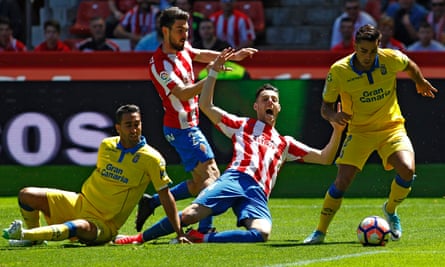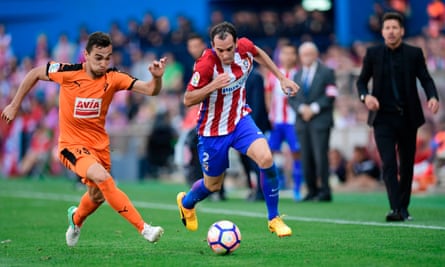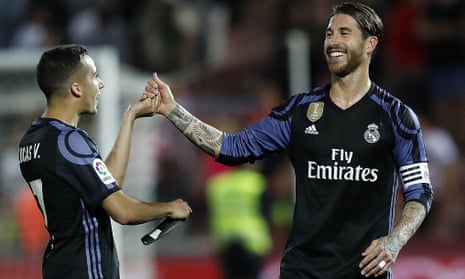Andrés Iniesta was underneath the stand at the Camp Nou, protected by a metal bar as he slowed to halt and a crowd gathered in front of him, arms poking out of a pile of squashed bodies, brightly-coloured sponge thrust towards his face. “What Neymar does is ballet,” Luis Enrique was saying through the door to his right, while to his left Gerard Piqué was about to appear too. “Neymar is magic,” the defender would insist. The Brazilian had danced his way past Villarreal, he, Leo Messi and Luis Suárez all scoring together for the twentieth time to take them past one hundred goals for the third season in a row, and Barcelona were top. But it wasn’t just about them, they knew, and Madrid were playing down in Granada. “Do you have any hope that they might slip up tonight?” Iniesta was asked.
“Well,” he replied, “I think they’re 2-0 up already.”
Er, three, Andrés. The words were barely out of his mouth when 683km away Álvaro Morata’s shot thumped off the bar and into the net. They were doing it again. 3-0 up after 29 minutes at Eibar, 3-0 up after 23 minutes at Leganés, and 2-0 up after 14 minutes at Deportivo, Madrid were 3-0 up after 30 minutes in Granada. Five minutes later, it was four. For the fourth consecutive game away, they had played a “B Team”, for the fifth time in six trips Cristiano Ronaldo didn’t even travel, and yet here they were winning. Even curious case Fabio Coentrao was playing – and the man who sadly admitted that he is not good enough for Madrid, of whom Zidane had accidentally said “he has a thing that hurts … his rectum”, had even clipped in the cross for the second. It was 4-0 at half time; the only surprise was that was the way it stayed.
And so the debate continued – B Team or A Team – and questions were asked about how long the “other” lot would put up with being the other lot, Álvaro Morata especially. Answer: until the end of the season. And until then, everyone smiles and everyone wins. The story of this season – one of them at least – is the story of the “subs”, Madrid’s depth, even if Luis Enrique did try to claim that his second string has played as much a part as Madrid’s, somehow not cracking up half way through Zidane admitted that it is not chance that he makes the changes away, resting Ronaldo especially: no game, no plane, no hotel.
Without him, Madrid have played five of the last six, winning them all and scoring four, six, three, four and four. Here, they went level with Barcelona at the top of the table again but they have a game in hand, their fate their own. Draw one and win two of their remaining three matches against Sevilla (h), Celta (a) and Málaga (a) and they will be champions for the first time in five years. Then there’s Europe, usually eclipsing the league but now perhaps accompanying it for the first time in 59 years. “We know what we have to do,” Zidane said, soon realising that the classic Castilian cliché had given him nowhere to go. “We have three finals left, and another final in the Champions League to maybe take us to … er … the final,” he smiled.
As for Granada, there was not much they could do. Even less than those other sides – and, hugely impressive though Madrid have been, there is a little bit of an asterisk by that run of games, what with them being at Eibar, Depor, Leganés, and Sporting, and now at Los Cármenes. In the second half, Madrid sent on Karim Benzema as a sub; he cost more than Granada did. “They’re on a totally different level,” Granada’s coach said. Next season, they will be, quite literally. In the summer, the Chinese company DDMC spent €37m buying a club that is basically an empty shell, that does not own its stadium, its training ground or two-thirds of its players; a season later, they’re heading to the second division, their manager admitting that they got it wrong and trusted the wrong people. “People have lost their jobs for it,” he said. “We admit the mistakes and we refuse to make them again.”
That manager, of course is Tony Adams. His record reads: played five, lost five, scored one, conceded thirteen. Things have not improved, but perhaps they were never going to. At least, not enough to survive. Which poses the question: why change? Why risk it? Why have that mark against your name? His role was, in his own words, to “come in, clean up, come back and check”, Winston Wolfe style, a solutions man at institutional level – and there was a hell of a lot of solve. There still is, although the sporting director has been replaced, directors too, and he has replaced himself as coach: the new manager will be named soon. He had enough to do in that role, so why become coach too? Why take over a team that is going down with seven games left? Saving them from relegation was never likely and kicking them up the arse didn’t work. It was always going to be one last throw of the dice, but it may have damaged him. “I was on a hiding to nothing,” Adams admitted.
“Maybe next season they’ll ask me – tell me – to take over with seven games to go and the team about to go up,” Granada’s coach grinned, looking to a future, happier times. “It would be nice to have my own team. I’ll have a good team one day.” One day, maybe, just not Saturday. And even good teams – very, very good teams – have been beaten by Madrid. B or A. “No disrespect to Zidane,” Adams said, “but swap teams please.” Adams can’t. Zidane, on the other hand, can. He just had.
Results and talking points
Budge along a bit. Salvador González Marco is going but probably not far. For the fifth and final time, “Voro” is leaving the Valencia manager’s post. That is what he hopes anyway. “I don’t want to be manager again,” he said yesterday, after the club finally confirmed that he was not going to continue beyond the end of the season. The problem is that is what he said last time – not long before he became manager again, the eternal caretaker taking over at Mestalla and winning more games in six matches there than Cesare Prandelli, Pako Ayestarán and Gary Neville had managed between them. Five times Voro came in, in 2008, 2012, 2015, 2016 and 2017, calmed things down, won football matches, and then walked very short distance off, heading back to his day job as the club’s delegate, returning to his seat a little further along the bench, before being bumped back up again in times of need.
Now, having steered them away from relegation, briefly becoming statistically the best coach in the club’s history, the story is set to repeat itself. Or is it?
This time, it is different. This time he had been given the job for a fixed term, his temporary role extended to the end of the season back in January. That is one of the reasons it will be harder to go back to the bench. Another is that this time, for the first time, Voro would have liked to have continued as manager. He would have liked to have been considered, anyway. He would have liked them to have talked to him, at least. Instead, he was ignored. Not just ignored for the job – ignored.
The former player, B team coach and delegate who never said a word out of place and never imposed himself on anyone; who took over as interim coach for the fifth time when, as striker Rodrigo put it yesterday, “very few people would have done so”; who recovered players like Dani Parejo, promoted Soler and Lato from the youth team, and rescued Valencia from relegation, was told two days ago that he would not be continuing. It was the first he had heard. “We got out of trouble quickly, so it looks easy,” he said yesterday. He was right, it does, and with the squad they have they should have never been down there, which helps to increase the sense that he had not done much. But they were down there and he had.
Realistically, Voro always knew it was probable, and of course he will not complain; nor will many at the club, including some players. They know his limitations and the nature of the way he took over, the way he has always taken over, his kind of permanently-temporary status, the eternal caretaker, make continuity complex. His methods would need to be modified too; it is not simple to make his solutions lasting ones and some feel that his impact diminished with time, the comfort he brought to the players losing is significance, perhaps even liable to become counterproductive. No one really saw him being a real manager, either, and he admits: “I knew from the start that, if things went well or if they went badly, this could happen”, adding: “It is normal that the club brings in a new manager in the year in which the sporting director, the coach and he president all leave.”
Perhaps it is. Less normal is for him not to know; the first he actually heard was two days ago. Until then, there had not been a word. “It hasn’t been talked about at all,” he admitted. Neither José Ramón Alexanko, the sporting director, nor Mateu Alemany, the new chief executive, said anything to him. He had not been consulted, nor included in the process of picking a replacement or planning for next year. He hadn’t been asked about the players he has been working with for the last six months.
Others had. In the meantime, while Voro worked, Valencia had lined up Quique Setién as coach, discussing plans for the new season with him, including transfer targets and training regimes – only for the owner, Peter Lim, to decide he was not convinced. And so, last week in Singapore the focus shifted to former Villarreal manager Marcelino, whose profile could not be any more different. As Cayetano Ros wrote, Alexanko and Alemany had borrowed from Groucho Marx: these are my principles, and if you don’t like them I have others. So, it was someone else. Just not Voro. And long after the decision to bid farewell to Voro had been taken – if it was a “decision” that even need “taking” at all, more a question that was never considered – he was actually told. He didn’t say anything; perhaps he should have done.
Now the question is where to put him. Voro says he wants to be useful. He has been before, sitting on the bench, ready to come on should they need him – and they have. Yet that is not so simple now. “I have been happy as a delegate but I don’t know if that is possible,” Voro said. “I am active and I need things to do.” After this, his first prolonged spell as coach, he might be seen as a threat by new managers – something he was quick to dismiss – and the sporting director role that could have suited him is now occupied by Alexanko. He is a club employee with no obvious employment, that place on the bench he had occupied for over a decade maybe now denied him. And so with two games left of his fifth spell in charge, a season he has saved, a decision must be made, something said.
“Thanks,” for a start.
After their 1-0 win over Las Palmas, Sporting Gijón’s fate is in the best possible hands. No, not their own. Don’t be daft. After all, even this weekend when they desperately needed a win against a team that has long consummated its collapse, they were strangely subdued, rarely looking like a team that was fighting for its life. No, the hands their fate is in are Betis’s. “Destiny has given Betis (always Betis) the chance to ride to their aid,” wrote the Asturias-based newspaper La Nueva España. It wouldn’t be the first time – it wouldn’t even be the second or the third – and Sporting are counting on it. Although they’ve been careful how they express it up until now, so are Leganés.

Sporting are three points behind Leganés; they have played a game more but they do have the head-to-head advantage, meaning they will survive should the two teams finish level. “We need a miracle,” centre-back Babin admitted a few days ago. They need help, certainly. And they’re optimistic that they will get it. Tonight, Leganés play Betis. On the final day, Sporting play Betis. At the Molinón, they’re hopeful that Betis will win the former and lose the latter and most Betis fans hope for the same outcome too. As Leganés midfielder Ruben Pérez put it, there’s a Sporting-Betis “brotherhood” that could go against them.
It has been a bit one-sided, but it is there, and it goes back to the back end of the 1996-97 season, when Sporting travelled to Betis, who knew that if they lost their rivals Sevilla would be relegated. With nine of their twenty players injured, the Betis fans cheering every Sporting attack and whistling when their own team went forward, a goal from Sporting’s Russian striker Denis Cherishev saw the stadium erupt. Betis’s fans went wild with the visiting supporters, cheering their own team’s defeat. Sevilla went down; Sporting survived. Three years later, there was sort of revenge when an already-relegated Sevilla were beaten by Oviedo sending Betis down too. That Oviedo are Sporting’s local rivals, only reinforced the identification: Oviedo-Sevilla, Betis-Sporting.
When Sporting travelled to Betis in the Second Division in June 2015, they unfurled a huge banner that read: “Congratulations on your promotion, Betis brothers! Together in primera. Let’s go Sporting!” Betis were already promoted but the only way that they could go up together was if Sporting won and Girona didn’t. Suspicions were expressed again. Sporting easily beat Betis 3-0, and a late equaliser from Lugo against Girona eventually sent them up, that game stopped and restarted, Montilivi having emptied fans thinking it was all over, and Sporting suffering a long, anxious wait down in Andalucía. Eventually, they celebrated their promotion with Betis’s fans. The following year – last season – Sporting again needed Betis. This time they needed Betis to beat Getafe on the final day to survive – which they did.
Now they need them again – starting tonight in Leganés.
Atlético’s goal against Eibar came from a great run up the left wing from … Diego Godín. Maybe Diego Simeone is right; maybe nothing is impossible.

No one wanted Sandro last summer, even though he was free. Plenty will want him this summer, even though he is not. The clubs that said they weren’t interested then – plenty of Premier League teams among them – are watching him now. So of course are his former club Barcelona, busy wondering what might have been and what might still be: a Sandro goal saw them beaten at Málaga to take the title from their hands; now they’re desperately hoping that another Sandro goal against Madid on the final day can put it back again. It’s not unlikely that he will score, at least: last night Sandro got his 13th league goal as the Rosaleda chanted “Sandro, stay!” Even Malaga’s manager, Míchel, who has overseen a revival that is mighty impressive, says he will dig into his pocket if it encourages the Canaria striker to continue with them.
Basque derby No12 was excellent, perhaps the game of the weekend, and it ended with Theo Hernández belting in the winner to take Alavés to a 1-0 win over Athletic, making life much more difficult. Athletic are still in that final European place, but Real Sociedad are level on points with them. (Villarreal are only a point ahead of them both). One place below that, but out of it now having miraculously competed for continental competition, are Eibar. And Alavés, who are 10th, have a Copa del Rey final to come. If they win, they’ll head to the Europa League; if they don’t, the team in seventh will. In other words, whatever happens at least two Basque teams will be in Europe next year – maybe even three. Which is pretty impressive, whichever way you look at it.
They really are Basque teams too: three of the four coaches played at Basque clubs; between them, they have more than forty Basque players (even before you start the Navarre debate) and almost sixty that have played in the youth system at a Basque club; and all four captains are Basque. All that in an area that accounts for just 1.4% of the Spanish territory and only 4.9% of its population, but a hell of a lot more of its footballing history and fidelity. “This was the best atmosphere of all the derbies,” Ernesto Valverde. “It was extraordinary for them; they’re going to play a final and they’re happy.”
There are 13 (or maybe 12, or maybe 11) days to go until Week 38 in the First Division in Spain, Week 39 in the Second, and still no one knows when those games will be played. Forty-two teams, waiting. And what about the fans? What about them?
Results: Sevilla 1–1 Real Sociedad, Sporting 1–0 Las Palmas, Atlético 1–0 Eibar, Barcelona 4–1 Villarreal, Granada 0–4 Real Madrid, Alavés 1-0 Athletic, Valencia 4-1 Osasuna, Deportivo 1–2 Espanyol, Málaga 3–0 Celta Tonight: Leganés-Betis

Comments (…)
Sign in or create your Guardian account to join the discussion